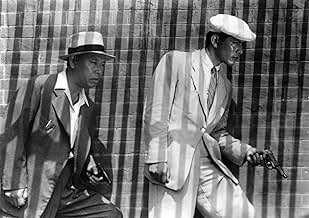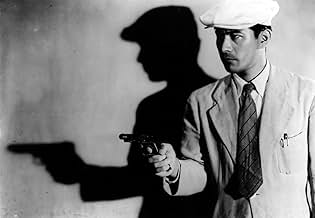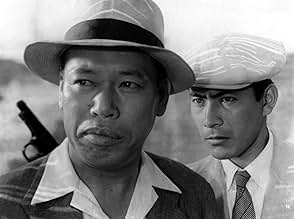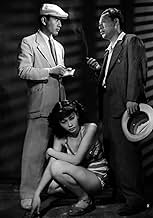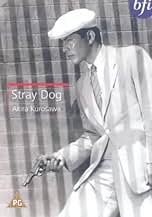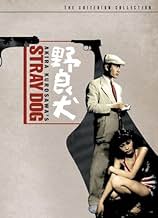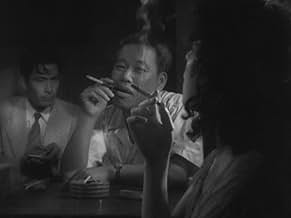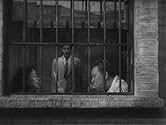Murukami, un joven detective de homicidios, pierde su pistola reglamentaria durante un trayecto en autobús. Agobiado por el sentimiento de deshonor más que por la pérdida trata infructuosame... Leer todoMurukami, un joven detective de homicidios, pierde su pistola reglamentaria durante un trayecto en autobús. Agobiado por el sentimiento de deshonor más que por la pérdida trata infructuosamente de recuperar el arma.Murukami, un joven detective de homicidios, pierde su pistola reglamentaria durante un trayecto en autobús. Agobiado por el sentimiento de deshonor más que por la pérdida trata infructuosamente de recuperar el arma.
- Dirección
- Guionistas
- Elenco
- Premios
- 4 premios ganados en total
- Dirección
- Guionistas
- Todo el elenco y el equipo
- Producción, taquilla y más en IMDbPro
Opiniones destacadas
As you might expect from such a genius, Kurosawa is not satisfied with a simple good-guys/bad-guys cops-and-robbers story. He explores in depth the social and economic conditions in postwar Japan which led many young people--particularly returning veterans--to take to crime, and also the particular circumstances which motivate the acts of Yusa (Isao Kimura), the criminal. Indeed, a series of mistakes by the hero, rookie detective Murakami (Toshiro Mifune), are one factor behind Yusa's crimes.
But neither is Stray Dog a facile blame-society message film, either. Kurosawa makes no excuses for Yusa. By giving Murakami a very similar history (so similar, in fact, that it comes off as a little contrived), Kurosawa makes the point that Yusa had the same choice as Murakami. That he chose differently is his responsibility.
But even more interesting to me is the character of chief detective Sato (Takashi Shimura), Murakami's superior officer, mentor, and friend.
Sato is the wise elder figure in this film, and in the hands of a lesser artist than Kurosawa, such a character generally ends up as a mouthpiece for the director's own viewpoint. Here, though, Kurosawa permits Sato to espouse a hardcore law-and-order philosophy: The cops are the good guys, the crooks are the bad guys, and that's it. Sato has no patience for Murakami's guilt feelings or touchy-feely philosophizing.
That Kurosawa would permit this view (which is not Kurosawa's view, nor the film's) to be given voice by the film's wisest, kindest, most competent, and most likable character is a mark of his confidence and courage.
Toshiro Mifune, looking young and handsome, is quite marvellous as the central character, a detective whose gun is stolen on a bus. What starts out as a detective nervous about finding his gun and fixing a silly mistake, develops into a frantic and desparate man who feels somehow responsible for whatever crimes are committed with his gun. The suspense and detective-story plot are well developed in Stray Dog, but what really makes the story captivating is the revelation of the central character's feeling of guilt throughout, and his learning about crime, criminals, and that what is important is to make good come of your mistakes.
A very young Toshiro Mifune plays the greenhorn detective who has his gun stolen and spends the rest of the movie trying to track down the culprit. As it turns out the culprit is a war veteran just like Mifune's character, only where the latter tried to do good and found an honest job, the former opted for the easy way out and became a criminal, using the stolen gun to rob and kill. This adds an additional layer of motivation for detective Sato. Not only does he have to restore his honour (ironically symbolised by the lost gun which he tries to retrieve), but also redeem himself by bringing the killer to justice. What makes matters worse for him is that every time his stolen gun is fired someone dies or gets injured, which adds another burden of guilt on the shoulders of the young detective.
The story might appear too moralistic and convenient (both antagonist and protagonist share a common background, being war veterans, making the distinction of good and bad all too easy), but it has to be seen in the context of the times. Mifune says that there are no bad people, only bad situations. But as his detective collaborator on the case remarks (played by the great Takashi Shimura, who also starred in Seven Samurai) he faced the same bad situation and made something good out of it. Kurosawa here neatly balances the social climate of post-war Japan and the conditions of the times with personal responsibility.
Story-wise it's a worthy effort, but like Rashomon, it sounds a little bit better than it actually is. Not that Stray Dog is a bad movie by any means, but clocking in at 2 hours it starts to drag near the middle. There are some nice set-pieces that showcase Kurosawa's growing talent (like the phone scene in the hotel where he uses inter-cutting to great effect) and the performances are solid all around. There's also a silent 10 minute montage of location footage shot in rundown neighborhoods as Sato searches the black market for his gun, which serves as a poignant snapshot of Japanese history.
Kurosawa would go on to achieve international acclaim with his next movie, Rashomon, but Stray Dog already shows that he was destined for great things. Compared to later entries in his filmography Stray Dog appears to be a minor entry, but it's still well worth the time to discover.
I was also intrigued by how almost every scene bears, already, the stamp of Kurosawa's unique vision as a director. I have no idea how this comes about, but there's just something there, almost like a fingerprint, that says "Kurosawa" unmistakeably. I would have to leave it to more gifted and better schooled viewers than myself to explain it, but I love seeing it. In part, I suppose it's due to the exceptionally fine cinematographers that Kurosawa habitually worked with.
I think the film is about thirty minutes too long, but if I have to see a film that's a bit too long, I'm at least glad it's by Kurosawa!
¿Sabías que…?
- TriviaMuch of the film was filmed from the slum streets of post war Japan. These were filmed under chief assistant director Ishirô Honda, who had gone with camera operator Kazuo Yamada into some dangerous, even yakuza run, territory. Many of the scenes of Toshirô Mifune's character from the waist down are actually Honda standing in. In his book, Something Like an Autobiography, Akira Kurosawa described Honda's role stating, "I had Honda do mainly second-unit shooting. Everyday I told what I wanted and he would go out into the ruins of postwar Tokyo to film. There are few men as honest and reliable as Honda. He faithfully brought back exactly the footage I requested, so almost everything he shot was used in the final cut of the film. I'm often told that I captured the atmosphere of postwar Japan very well in Stray Dog, and if so I owe a great deal of that success to Honda."
- ErroresAt one point, there is a man playing a tune on a harmonica that needs two people with harmonicas to play.
- Citas
Police Inspector Nakajima: Bad luck either makes a man or destroys him. Are you gonna let it destroy you? Depending how you take it, bad luck can be a big break.
- ConexionesFeatured in Kurosawa Akira: Tsukuru to iu koto wa subarashii: Stray Dog (2002)
- Bandas sonorasThe Waves of the Danube
(uncredited)
Composed by Iosif Ivanovici
[Played on a harmonica outside the bar when Murakami follows Ogin]
Selecciones populares
- How long is Stray Dog?Con tecnología de Alexa
Detalles
- Fecha de lanzamiento
- País de origen
- Idiomas
- También se conoce como
- Stray Dog
- Locaciones de filmación
- Ameya Yokocho market, Ueno, Tokio, Japón(black market scenes)
- Productoras
- Ver más créditos de la compañía en IMDbPro
Taquilla
- Total en EE. UU. y Canadá
- USD 46,808
- Fin de semana de estreno en EE. UU. y Canadá
- USD 15,942
- 28 jul 2002
- Total a nivel mundial
- USD 47,023
- Tiempo de ejecución
- 2h 2min(122 min)
- Color
- Mezcla de sonido
- Relación de aspecto
- 1.37 : 1


